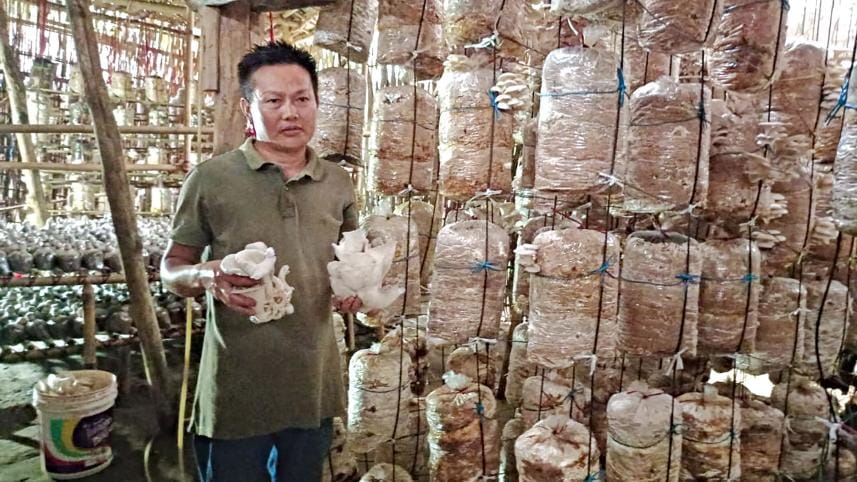Sumedh shines in mushroom farming

Oyster mushrooms can be seen blooming out of cylindrical containers in a small straw hut with a thatched roof. A family is invested in plucking the ones that are ready for harvest, while a young man checks for the ones that are yet to bloom.
This is the sight this correspondent was welcomed to during his recent visit to Borogang Mushroom Agro Farm in Shapchhari union under Rangamati Sadar upazila.
Initiated in January 2021, Sumedh Chakma, the farm's proprietor, has seen a promising commercial success in mushroom cultivation.
However, his journey to success was a rather bumpy ride.
Deeply interested in mushroom cultivation, Sumedh wanted to pursue training in it. However, his plans did not bear fruit due to a lack of resources and training facilities.
Unable to find a scope, he turned to YouTube for insights on mushroom farming.
"The videos demonstrated various techniques which I decided to try when I first began growing oyster mushrooms. However, accessing the spores [seeds] was the most challenging part," he mentioned.
Making ends meet with whatever resources and insights he could find online, Sumedh was finally able to take advanced training on mushroom farming from the horticulture centre near his locality.
The training revealed a new world of mushroom varieties and techniques to Sumedh.
"This year, I tried growing milky mushrooms, the first indigenous variety to be grown commercially in the country, and saw success. I plan to produce three varieties in total from now on," mentioned Sumedh, who has so far earned Tk 14 lakh against an investment of Tk 7 lakh.
Planting spores nurtured in his farm, Sumedh produces about four tonnes of mushrooms annually.
With a daily yield of 10-15 kilos, the mushrooms are sold to wholesalers for Tk 200-300 and for Tk 280-300 in retail.
Sumedh's success has paved the way for many others who now wish to pursue mushroom farming commercially.
"I really liked Sumedh's farm and want to get involved in mushroom farming," said Niketan Chakma, a local.
The horticulture centre in Rangamati's Assam Bosti area provides week-long training on mushroom farming, informed Md Moniruzzaman, deputy director of Department of Agricultural Extension in Rangamati.
"We also provide spores to those interested," he added.



 For all latest news, follow The Daily Star's Google News channel.
For all latest news, follow The Daily Star's Google News channel.
Comments